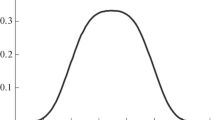Abstract
In the paper the problem of determining the thermal conductivity coefficient that depends on temperature is studied. The consideration is based on the mixed boundary value problem for the two-dimensional unsteady-state heat equation. The inverse coefficient problem is reduced to a variation problem. The mean-root-square deviation of the heat flux obtained by solving initial-boundary value problem from the experimental data on the boundary of the considered domain is used as the objective functional. The optimal control problem is solved numerically. The objective functional is minimized using the gradient methods. It is well known that it is very important for the gradient methods to determine accurate values of the gradients. For this reason, in this paper we used the efficient fast automatic differentiation technique, which gives the exact functional gradient for the discrete optimal control problem. The examples of solving the inverse coefficient problem confirm the efficiency of the proposed algorithm.




Similar content being viewed by others
References
Alifanov, O.M., Cherepanov, V.V.: Mathematical simulation of high-porosity fibrous materials and determination of their physical properties. High Temp. 47, 438–447 (2009)
Czel, B., Grof, Gyula: Inverse identification of temperature-dependent thermal conductivity via genetic algorithm with cost function-based rearrangement of genes. Int. J. Heat Mass Transf. 55(15), 4254–4263 (2012)
Cui, M., Yang, K., Xu, X.L., Wang, S.D., Gao, X.W.: A modified Levenberg-Marquardt algorithm for simultaneous estimation of multi-parameters of boundary heat flux by solving transient nonlinear inverse heat conduction problems. Int. J. Heat Mass Transf. 97, 908–916 (2016)
Matsevityi, YuM, Alekhina, S.V., Borukhov, V.T., Zayats, G.M., Kostikova, A.O.: Identification of the thermal conductivity coefficient for quasi-stationary two-dimensional heat conduction equations. J. Eng. Phys. Thermophys. 90(6), 1295–1301 (2017)
Evtushenko, YuG: Computation of exact gradients in distributed dynamic systems. Optim. Methods Softw. 9, 45–75 (1998)
Zubov, V.I.: Application of fast automatic differentiation for solving the inverse coefficient problem for the heat equation. Comp. Math. Math. Phys. 56(10), 1743–1757 (2016)
Albu, A.F., Evtushenko, Y.G., Zubov, V.I.: Identification of Discontinuous Thermal Conductivity Coefficient using Fast Automatic Differentiation, Conference Proceedings: Learning and Intelligent Optimization. Lecture Notes in Computer Science, vol. 10556, pp. 295–300. Springer, Cham (2017)
Zubov, V., Albu, A.: The FAD-methodology and recovery the thermal conductivity coefficient in two dimension case. Optim. Appl. 1987, 39–44 (2017)
Samarskii, A.A.: The Theory of Difference Schemes. Marcel Dekker, New York (2001)
Author information
Authors and Affiliations
Corresponding author
Rights and permissions
About this article
Cite this article
Albu, A., Zubov, V. Identification of the thermal conductivity coefficient in two dimension case. Optim Lett 13, 1727–1743 (2019). https://doi.org/10.1007/s11590-018-1304-4
Received:
Accepted:
Published:
Issue Date:
DOI: https://doi.org/10.1007/s11590-018-1304-4




